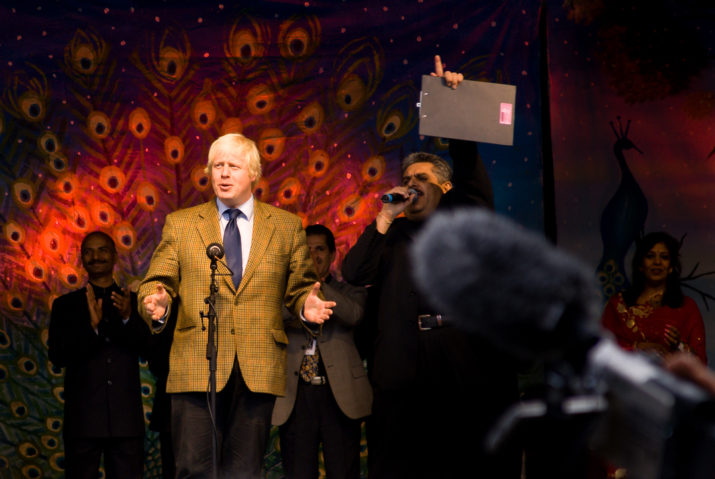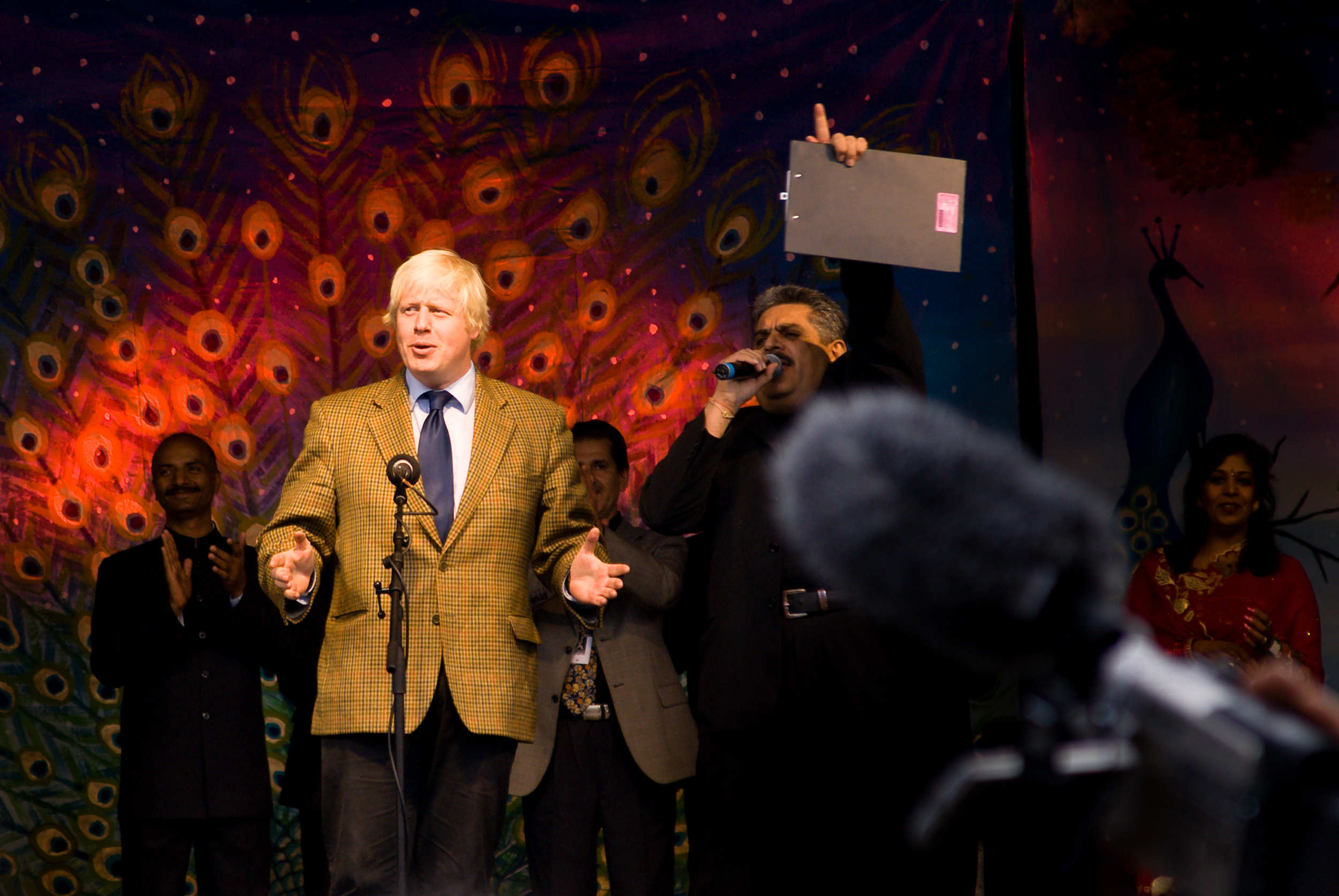

This is part of our special feature The Gender of Power.
This article explores the nuanced and often contradictory ways in which white bourgeois masculinities are constructed in contemporary British politics.[i] It focuses on the polyvalent discourse of effeminacy in history as it currently manifests in party discourses, as well as reported public opinion on Boris Johnson and Jeremy Corbyn. I’ll be prompting readers to think about how Johnson and Corbyn both variously exploit and repudiate their effeminized political personas. In the wake of the June 8th snap General Election in the UK, my contribution requires us to think back, a mere week or so, to a time when Jeremy Corbyn was written off, by the many and not the few, as unelectable. This piece aims to bring into sharp relief those forces that we all tacitly accept, which ensure that some white men are deemed to be electable, whilst others are not.
Unelectable White Masculinity?
In our current political matrix, which structurally prioritizes able-bodied white maleness as a perquisite to the holding of power; a system which dis-advantages and excludes a range of groups: women, the working class, people of color, those with disabilities, non-binary and Trans* people; excludes as not only unelectable, but often as non-citizen, and even non-human, readers might rightly pause to ask why I should be writing about the un-electability of some white men over other white men. Why should I even address the phenomenon that some white men are deemed unelectable by a system that is ultimately based on the electability of white men? In response, I think it important because it is this very phenomenon, hard-wired into British political culture since at least the Age of Enlightenment, that remains the default setting for who gets to wield power; crudely speaking, if we can re-think this default setting, then the exclusive game of who has authority and who does not, can be fundamentally re-thought. In this way, we might uncover one of the origin narratives for white male political privilege; we might therefore deconstruct white maleness from the inside out. Of course, I think that this is part of the conversation we should be having, but obviously not the entire conversation.
English Masculinities Put to Vote
Through their proposed policies, parties contesting the 2017 General Election prompt us to vote on a confluence of material issues concerning the economy, the NHS, Brexit, education, social care, and national security. However, I sense that voters are as much influenced by the immaterial as the material; media-driven hype about politicians and their policies being either “strong and stable” or “weak and wobbly” can profoundly change minds. The rhetoric of this general election, I think, can be reduced to these four words and to the gendered binary that they form: “strong and stable” versus “weak and wobbly.” The gendered nature of this political rhetoric means that it is not only the NHS, or the economy, or Brexit, that voters consider in the voting booth, but it is also the question of which candidate is strongest? Weakest? In the case of the biased electoral coverage on Jeremy Corbyn, we can see that the very question of what it means to be a man – and what it means to be the kind of man who holds power – is being put to vote. Acknowledging that the focus of my article is on white cis-gendered maleness, I will argue that effeminacy is the marked transgression that manifests in media reportage and political analysis on Johnson and, more importantly, on Corbyn; it is their shared, albeit very different, perceived effeminacies, which signals that vaguely construed quality that renders them unelectable for many voters, white and privileged though they are.
By “unelectable” I do not mean that these men are unelectable to positions of relative power; we have seen Johnson as Mayor of London 2008-2016, and Corbyn, before his first election as Labour party leader in 2015, was as an MP for Islington North since 1983. Yet, relatively speaking, the positions of Mayor and backbencher lack real political capital and influence. By “unelectable,” I mean unelectable as prime minister (the office of ultimate power within the British political imaginary); a fact which has already played out in Boris Johnson’s bowing out of the race to succeed David Cameron, which was due to his inability to command “enough support from his party [in 2016], after … the business minister Nick Boles and the pro-Brexit MP Dominic Raab, defected to the Gove camp.”[ii] When faced with the prospect of the clownish “Bojo” as prime minister, Johnson’s supporters fled to the more predictable Michael Gove. Once again, in the shock aftermath of Theresa May’s loss of the Conservative’s majority in the House of Commons, and calls for her resignation, speculation on whether or not Johnson will succeed has been met with wry laughter by commentators from within his own party. In this regard, we might say that Johnson’s effeminate campiness is both his source of political strength and his ultimate weakness. As I’ll argue later, Johnson’s campy masculinity has a long-tradition in English culture, and, as novels and plays since the eighteenth-century tell us, he signifies a type that can be easily managed once he is kept out of positions of real power (we might think about how the Conservative’s call to vote for Theresa May and her unspecified “team” tactically minimizes the “Bojo” circus). That Johnson’s antics need stage management reveals a tension between political power and the power of camp. If, as Susan Sontag argues, “Camp is art that proposes itself seriously, but cannot be taken seriously because it is ‘too much,’” then we might say that “Bojo” is the camp conservative who proposes himself seriously, but who cannot be taken seriously because he is too much.[iii]
We might usefully make comparisons between Johnson’s political persona “Bojo” and the hyper camp of Donald Trump; both Johnson and Trump conflate their political and personal selves; the greater their supposed authenticity the greater their implicit confidence; the more scandal or personal flaws found the more trustworthy they are. Moreover, “Bojo” and “The Donald” bemoan, and attack, political correctness as an impingement on their authentic maleness, so much so that white men like them suddenly become the true victims of misogyny, racism, and homophobia via the PC culture of liberal intolerance. Johnson and Trump deploy their outrageous spectacles of camp to great populist effect. Far from unsettling or disturbing their own supporters, their brand of camp reassures straight white men because it affirms that they can really do and say whatever they want. Candida Yates has written about Boris Johnson’s flirtatious relationship with Londoners during his time as mayor, arguing that it is his possession of that “very traditional English trait of refusing to commit and take things too seriously which taps into Johnson’s populist appeal as a ‘post-ideological politician.’”[iv] Johnson’s “retro-masculinity,” as Yates terms it, functions to shore up the loss of “patriarchal masculinity and the hitherto fictions that sustain it.”[v] Reading flirtation historically, Yates notes its gendered meaning and specific association with the eighteenth-century female figure of the coquet, yet, in doing so, she neglects to mention the rich vocabulary that existed for male seducers and womanizers in the same period. Far from being a coquet, we might properly place Johnson’s political flirtation in the tradition of English foppery. Just as the fops of the eighteenth-century stage and page, as Elaine M. McGirr argues, “repeatedly perform their own inadequacy,” Johnson’s own foppery serves to make a comedic success of his many failures.[vi]
There is a long history of effeminacy as a shaping discourse in British political culture. My recent book Effeminate Years: Literature, Politics, and Aesthetics in Mid-Eighteenth-Century Britain (2017), takes this as its subject; it traces the development of our modern ideas of political masculinity back to the mid-eighteenth-century period in Britain to show how the emergence of political agency in Western modernity was shaped by anti-effeminate ideas and beliefs. Writing about the pervasiveness of effeminacy in 1757, John Brown thought that England was on the verge of imminent cultural collapse. Not only have men “sunk into Effeminacy,” but women have also “advanced into Boldness,” leaving “their peculiar and characteristic Manners . . . confounded and lost.” As a result of the perceived effeminacy of both men and women, Brown feared that Britain’s patriotic spirit of national defense had been sapped, as “Effeminate minds cannot contain public spirit or Love of our Country.”[vii] I think that Brown’s firm belief that effeminate men cannot be patriotic is deeply imbricated in political culture in the West; it is an ingrained belief that continues to have ramifications for contemporary queer subjects whose bodies, practices, and desires eschew heteronormative rubrics. If effeminate men cannot be patriotic, then they also cannot be invested with political power; to be effeminate, is by its very definition, to be an enemy of the state. Charges of effeminacy, in any period or context, are readily tied to attempts at de-legitimation and the consolidation of power. As Sally O’Driscoll notes, “Effeminacy is stable in its designation of deviance, yet mutable in the content of its deviation.” Thus, the effeminate subject marks a divergence that serves to signpost, not undermine, the norm.[viii]
There are different registers for the effeminate in the eighteenth-century, which are aligned with men’s excessive sexual enjoyment of women, as well as men’s sex with other men; of course, there is no such thing as an effeminate gay man in the period, because, as Alan Sinfield tells us, gay identity is a post-1970s construction, culturally and temporally specific, and unique in how it is currently conceived.[ix] However, some effeminate figures, like the Mollies, were quickly becoming linked to sodomy, so much so, that by end of the period, the dangerous potential for women to effeminize men is almost forgotten about. Sodomy has an even longer historical cache, which is ideologically loaded, enfolding a range of negatively defined positions; to be a sodomite in early modern England is also to be a papist, a foreigner, and a seditious anarchist. When I begin to think about reactions to Jeremy Corbyn, I am struck by how very archaic ideas about what kind of manliness is proper for England and its institutions are gaining new traction in this election and in its aftermath. I would even go as far as to wager that the media-peddled perception that Jeremy Corbyn is effeminate ended up costing Labour the most votes on June 8th.
Effeminate Corbyn
In what follows, I will sketch out some of the ways in which Corbyn has been figured as effeminate before briefly mentioning how his effeminate politicking has conversely won him new allegiances. When voters are asked about their view of Corbyn, they will find words like “weak” or “feeble.” The interview broadcast on the 5th of May by BBC News at Six in the wake of the local election results is a case in point; the interview consists of two men and a woman in Liverpool, all traditional Labour voters, who are asked if they would support Corbyn as prime minister. The first man says: “He looks weak … he’s not strong …he looks like a wet cod,” whilst the second man interviewed claims that: “Corbyn will get ripped to bits in the negotiations.”
When the public relations company, Edelman, convened two focus groups, one male and one female, they asked participants to write one word that they associated with Corbyn. The responses from the women (who at 52 percent of voters constitute the majority of the electorate) were as follows: “Joke,” “silly,” “untrustworthy,, “NHS,” “not a lot,” “don’t know,” and “they all say what they want you to hear.”[x] The male focus group is even more revealing when it comes to Corbyn. One man took quite a nasty swipe at Corbyn’s overgrown garden. The idea of an Englishman and his well-kept garden is long-standing, and, I expect that this comment is really about Corbyn’s effeminate relationship to phallic power. By this very illogic, Corbyn cannot manage his own garden, he cannot render himself or his environs productive.
Most interestingly, the male focus group actually pinpoint Corbyn’s decline to the 2015 commemoration of the Battle of Britain service when he was filmed standing in silence as other dignitaries mouthed “God Save the Queen.” The episode caused quite a stir, with Sir Nicholas Soames, the grandson of Winston Churchill, that paragon of English patriotism, wading in to say that: “It was an extremely disrespectful thing and I think he needs to make his mind up whether he is a grown-up or not.”[xi] Soames, having inherited the custodianship of who gets to be a patriot, pronounces Corbyn unfit, while also infantilizing both Corbyn and his politics as not sufficiently mature enough to warrant our attention. When Corbyn made it be known that he would sing the anthem the next time round, this led to accusations of him being unprincipled and feeble.[xii] I find it really significant that Corbyn’s perceived refusal to sing the national anthem – taken by many to be an indirect insult to the Queen – is the very thing that sticks in the minds of male voters when they ask themselves where it all went wrong. We might say that for this group of men, it is Corbyn’s refusal to be patriotic, which betrays his effeminate inability to command their respect, and importantly, their vote. Corbyn’s perceived lack of “proper patriotism” has conversely gained him access to cultural arenas that fall beyond the privileged pale of white masculinity. His garnering of the support of artists such as Akala, a first-time voter, and the associated “grime4Corbyn” movement, make manifest Corbyn’s significant appeal to Black and Minority Ethnic masculinities.
In mid-May, as the campaign unfolded, and as I began to draft this article, the mood toward Corbyn seemed to be radically shifting. People began to stop saying that he was unelectable, and were, perhaps, beginning to re-think why he might be considered to be unelectable? I hoped to end up writing a very different article, but as I finished, the most horrific act of violence occurred in Manchester, cruelly targeted at young girls and, although it hasn’t been widely acknowledged, effeminate men. In light of this atrocity, the issue of strong “security” served to dominate the remainder of the election, with a further terror attack in London on June 3rd, occurring mere days before polling day. In the wake of the Manchester attack, Theresa May used her address to the nation to remind everyone that, in the past, Manchester has suffered other terrorist attacks; a reference which recalled the IRA bombing of the Arndale Centre in 1996. For the past number of weeks, Tory propaganda has been spinning the misinformation that Corbyn supported IRA murder, and therefore posed a severe risk to national security. That the Tories have knowingly made this claim in a context in which the Stormont power-sharing executive is in crisis, betrays the depressing fact that Theresa May is willing to risk peace in Northern Ireland for her own political gain. The fact that May has entered into a “confidence and supply arrangement” with the deeply homophobic, reactionary, and socially conservative Democratic Unionist Party, in order to reach the majority required to govern confirms this, whilst also being highly ironic given her objections to Corbyn’s past links to Sinn Fein and the peace efforts in Northern Ireland. However reinvigorated the Labour Party might be after their electoral success, Corbyn will have to negotiate the construction of his own masculinity carefully, as Tory spin will predictably revive in this insecure post-election world the old tried-and-tested belief that effeminate minds cannot be patriot; re-activating the ingrained notion that effeminacy somehow negates one’s power, patriotism, and political capital.
Dr. Declan Kavanagh is a lecturer in eighteenth-century studies and Director of the Centre for Gender, Sexuality, and Writing at the University of Kent. His monograph, Effeminate Years: Literature, Politics, and Aesthetics in Mid-Eighteenth-Century Britain is out this June in Bucknell University Press’s Transits Series.
Photo: Boris Johnson, Mayor of London, speaking at Diwali in the Square in Trafalgar Square, Francesco Carucci | Shutterstock
References:
[i] This paper was originally delivered at the CHASE: Sex, Gender, and Violence research seminar on “Kitten Heels and Unelectable Masculinity: Gendering the General Election 2017” (May 24th 2017), which was organised by Eleanor Careless (Sussex University), Edwin Coomasaru (The Courtauld Institute of Art), and Alex Coupe (Goldsmiths). My thanks to them for their kind invitation to speak.
[ii] Heather Stuart and Jessica Elgot, “Boris Johnson rules himself out of Tory leadership race”, The Guardian, Thursday 30 June 2016 13.20 BST, available at: https://www.theguardian.com/politics/2016/jun/30/boris-johnson-rules-himself-out-of-tory-leadership-race-brexit-eu-referendum
[iii] Susan Sontag, “Notes on Camp” (1964), p. 6, available at: https://monoskop.org/images/5/59/Sontag_Susan_1964_Notes_on_Camp.pdf
[iv] Candida Yates, (2010) ‘Turning to Flirting: Politics and the Pleasures of Boris Johnson’ Rising East, Vol 2 Series 1 No. 2., pp. 1-2.
[v] Ibid., p. 2.
[vi] Elaine M. McGirr, Eighteenth-Century Characters: A Guide To The Literature of the Age (Houndsmill: Palgrave macmillan, 2007), p. 40.
[vii] Declan Kavanagh, Effeminate Years: Literature, Politics, and Aesthetics in Mid-Eighteenth-Century Britain (Lewisburg, PA: Bucknell University Press, 2017), pp. xvii-xviii.
[viii] Ibid., p. xxiii.
[ix] Alan Sinfield, Gay and After: Gender, Culture, and Consumption (London: Serpent’s Tail, 1998). P. 7.
[x] Paul Waugh, “Jeremy Corbyn Turning Off Labour Voters, HuffPost UK-Edelman Focus Group Finds: Some will vote Tory solely to oust Labour leader from his job”: 29/04/2017 10:01 | Updated 14 May 2017, available at: http://www.huffingtonpost.co.uk/entry/jeremy-corbyn-turning-off-labour-voters-in-slough-huffpost-uk-edelman-focus-group-finds_uk_5904443ce4b05c39767fcab0
[xi] Dan Bloom, “Jeremy Corbyn attacked for refusing to sing the national anthem at WW2 memorial service”, The Mirror, 15:42, 15 SEP 2015, available at: http://www.mirror.co.uk/news/uk-news/jeremy-corbyn-attacked-appearing-stay-6447545
[xii] Allan Massay, “Jeremy Corbyn should stand by the dignity of silence”, The Telegraph, 1:59PM BST 18 Sep 2015, available at: http://www.telegraph.co.uk/news/politics/Jeremy_Corbyn/11874444/Jeremy-Corbyn-singing-national-anthem-sometimes-silence-is-more-dignified.html
Published on July 6, 2017.




